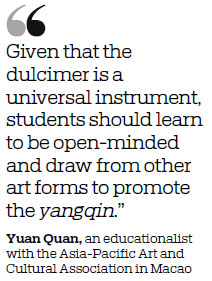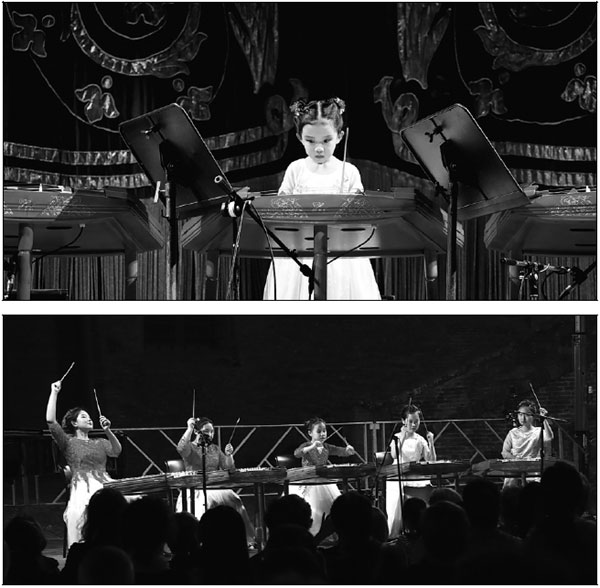All-round learning from a universal instrument
At a recent festival dedicated to the yangqin, young people were to the fore
At the third International Dulcimer Music Festival in Beijing from Aug 11 to 16, a concert performed entirely by children and teenagers received particular attention. The youngest performer was just 4 years old, playing the yangqin standing up because she was not tall enough to sit on a stool.
With yangqin education for young people uppermost in their minds, experts and artists joined in discussions at the festival, looking for innovative teaching methods to help young learners acquire techniques and keep them enthusiastic about the instrument.
Fu Bing, a yangqin player and examiner for yangqin grading exams, says more parents are now willing to invest in their children's all-round education, and the number of young people learning the instrument has grown steadily in recent years.
|
Yangqin ensembles for young children are emerging, and the Beijing Junior Jasmine Ensemble, established last year, has already given dozens of performances in both China and overseas. |
Yangqin ensembles and extracurricular training courses for young children are also emerging, the Beijing Junior Jasmine Ensemble being one of the most notable examples.
The ensemble, established last year, has already given dozens of performances in both China and overseas, and its members have won several gold awards in international music competitions.
The ensemble is associated with the Jasmine Ensemble, which was founded by Liu Yuening, a musician and researcher, in 2008 and comprises young professional yangqin performers.
While the Jasmine Ensemble has been taking the sounds of the yangqin overseas, Liu is not complacent and so, with a yangqin player and composer, Chen Yunyun, established this junior ensemble for children with the aim of passing on expertise to coming generations.
"Learning musical instruments is more than simply acquiring the techniques," Liu says. "More importantly, it means taking up the responsibility to inherit and promote our culture, and to contribute to the overall development of world music."
So an evident feature of this ensemble is that each student is supervised by a professional musician who belongs to the Jasmine Ensemble, which means the children can enjoy one-on-one instruction.
Apart from professionalism, fun is another keyword in the children's everyday training. First and foremost, happiness and friendship are what Liu says she would like the children to gain from learning music.
Miao Yuwen, 8, who started learning yangqin 16 months ago, is an outstanding member of the troupe and the only one to have won three gold awards in the festival.
In addition to playing the yangqin she has been learning piano and violin, but likes the yangqin most because of its pleasant sound and because it is the easiest to play.
A consensus among the experts and teachers is that enthusiasm is crucial for young yangqin learners.

"We try to enhance the interests of the students by infusing fun into the teaching process, for example by using games to train their techniques and different forms of performance that can develop their collaborative skills," Chen says.
Wang Jingjing, an instructor with the Hua'er Ensemble in Hangzhou, says that teaching students as an ensemble rather than individually can engage young people more effectively.
"The sound of an ensemble is so much different from a solo performance. It's richer and more complex. Also, an ensemble requires ingeniously arranged compositions. So we provide students with general music courses in addition to yangqin techniques, such as composing and arranging. Some of our young students now know how to arrange popular tunes into yangqin compositions for practice."
Yuan Quan, an educationalist with the Asia-Pacific Art and Cultural Association in Macao, says the association is experimenting with creative concert formats to help more people understand and appreciate Chinese traditional music.
"We encourage our students to design their own yangqin concerts. They can conceive their own ideas and the teachers help the students execute them."
For example, students can choose a specific theme for their concert and the repertoire can be connected into a compelling storyline. When telling the story, the presenter can further incorporate historical facts about yangqin, so the audience can learn something from the concert.
"Music education is about introducing people into this broad world of art, rather than confining them to a single instrument," Yuan says. "Given that the dulcimer is a universal instrument, students should learn to be open-minded and draw from other art forms to promote the yangqin."
(China Daily Global 09/25/2019 page15)



















